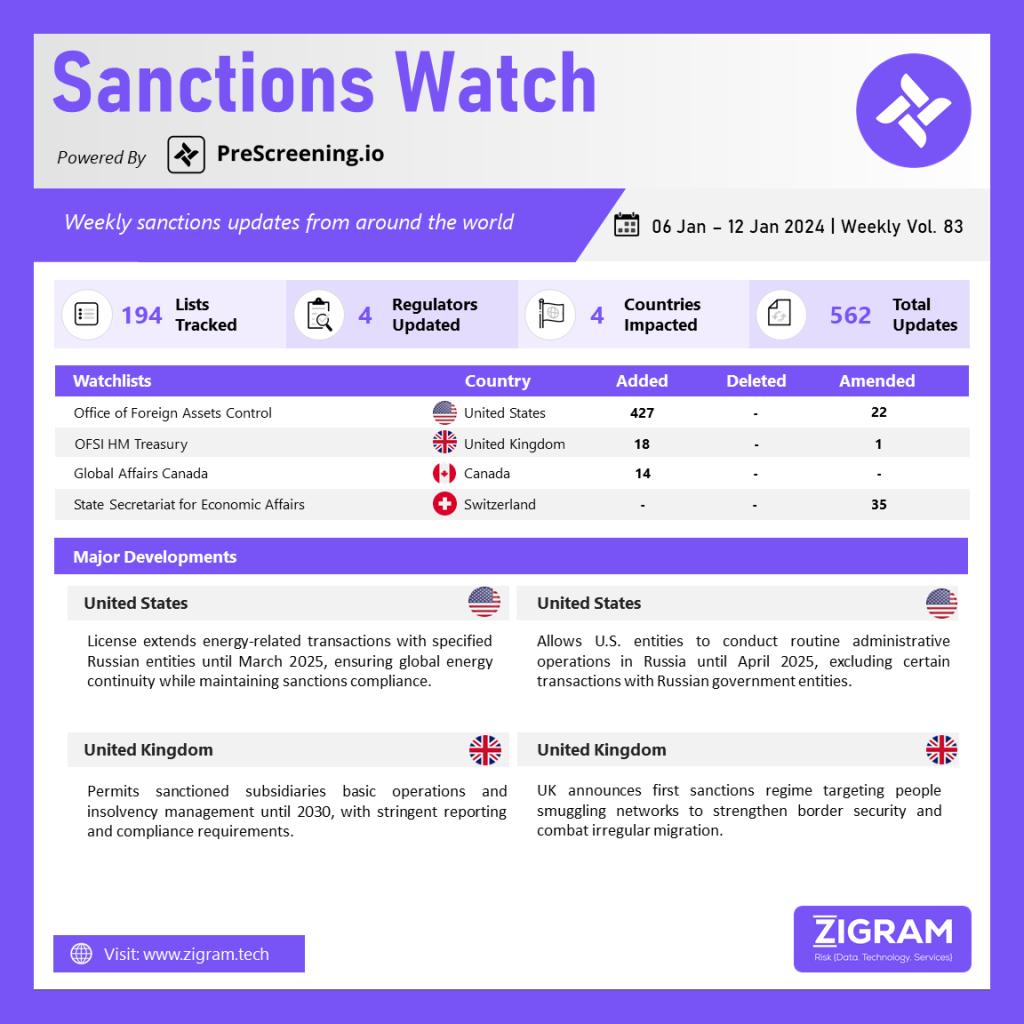Sanctions Watch Vol 83
In the latest edition of our Sanctions Watch weekly digest, we present significant updates on sanction watchlists and regulatory developments.
1. OFAC Issues General License 8L Allowing Continued Energy-Related Transactions with Specific Russian Entities Until March 2025
The U.S. Department of the Treasury’s Office of Foreign Assets Control (OFAC) issued General License No. 8L on January 10, 2025, under the Russian Harmful Foreign Activities Sanctions Regulations (31 CFR part 587). This license replaces General License No. 8K and is effective immediately, authorizing certain transactions related to energy until March 12, 2025.
The license permits wind-down transactions involving specified Russian financial institutions and entities in which they hold a 50% or greater ownership. Covered institutions include Sberbank, VTB Bank, Alfa-Bank, and others. Activities authorized under the license are those “related to energy,” encompassing the extraction, production, transport, and trade of various energy products such as petroleum, natural gas, and biofuels.
The license does not permit transactions prohibited by specific directives under Executive Order 14024, including those involving sovereign debt or correspondent accounts for restricted entities. Additionally, transactions with blocked persons or entities outside the license’s scope remain prohibited.
This regulatory adjustment emphasizes OFAC’s focus on balancing sanctions enforcement with ensuring the continuity of critical global energy operations.
2. OFAC Issues General License 13L to Facilitate Administrative Transactions in Russia Amid Sanctions Compliance
The U.S. Department of the Treasury’s Office of Foreign Assets Control (OFAC) has issued General License No. 13L under the Russian Harmful Foreign Activities Sanctions Regulations (31 CFR part 587). This license permits U.S. persons, and entities owned or controlled by U.S. persons, to conduct certain administrative transactions in Russia. These include paying taxes, fees, import duties, and obtaining permits, licenses, or tax refunds. Such transactions must be routine and necessary for the day-to-day operations of these entities and are authorized until on April 9, 2025.
However, the license does not permit debits from accounts held by the Central Bank of Russia, the National Wealth Fund of Russia, or the Ministry of Finance of Russia at U.S. financial institutions. Additionally, it does not authorize any transactions prohibited by the Russian Harmful Foreign Activities Sanctions Regulations, including dealings with blocked persons, unless separately authorized.
This new license, effective January 7, 2025, replaces and supersedes General License No. 13K issued on September 30, 2024. The acting director of OFAC, Lisa M. Palluconi, signed the updated license. This regulatory change reflects ongoing adaptations to U.S. sanctions policies related to Russia.
3. UK Treasury Grants Extended Permissions for Subsidiaries of Russian Entities to Maintain Basic Operations and Manage Insolvency Proceedings
The UK Office of Financial Sanctions Implementation (OFSI) under HM Treasury has issued General Licence INT/2022/1280876 pursuant to the Russia (Sanctions) (EU Exit) Regulations 2019. This licence permits specific transactions by UK, Guernsey, and EU subsidiaries of sanctioned entities such as VTB Capital plc and Sberbank CIB (UK) Ltd. Authorized activities include payments for basic operational needs, such as taxes, insurance, utilities, employee remuneration, property management fees, and professional legal services. It also allows actions related to insolvency proceedings, including the establishment and operation of trusts like the Holding Period Trust and NSD Trusts to manage frozen assets.
This licence is valid until on April 3, 2030, and requires entities to notify HM Treasury of any permitted activity within seven days and submit annual reports. Subsidiaries must maintain records of all activities for six years. However, the licence explicitly prohibits funds or economic resources from being made available to or benefiting designated persons under the Russia Regulations, except as stipulated.
OFSI retains the authority to vary, revoke, or suspend this licence at any time, and entities relying on it must ensure compliance with its terms to avoid regulatory breaches.
4. UK to launch world first sanctions regime to snare people smugglers travelling upstream
The UK government has unveiled plans to implement a world-leading sanctions regime designed to dismantle people smuggling crime rings and disrupt their illicit financial flows. The initiative, announced by Foreign Secretary David Lammy, represents a critical component of the government’s “Plan for Change,” which seeks to strengthen border security, reduce irregular migration, and eliminate reliance on asylum hotels.
As the first standalone sanctions framework targeting irregular migration and organised immigration crime, the regime will empower the UK to directly target individuals and entities facilitating dangerous journeys and exploiting vulnerable individuals. Scheduled to take effect within the year, this autonomous scheme will also benefit from close collaboration with international allies, reinforcing partnerships formed during the UK-hosted European Political Community and agreements with G7 nations.
The sanctions regime will complement broader measures, including £150 million in funding for the Border Security Command and enhanced Serious Crime Prevention Orders, which introduce travel bans and restrictions on suspected smugglers. It reflects the government’s innovative approach to securing borders and combating global security challenges.
Prime Minister Keir Starmer affirmed the UK’s commitment to saving lives and protecting national borders, while Foreign Secretary Lammy highlighted the importance of advancing bold and practical solutions to address organised immigration crime effectively.
Know more about the product: PreScreening.io
Click here to book a free demo.
Sanctions Watch is a weekly recap of events and news related to sanctions around the world.
- #OFAC
- #OFSI
- #RussiaSanctions
- #GlobalEnergy
- #GeneralLicense
- #PeopleSmuggling
- #BorderSecurity
- #SubsidiariesOperations
- #GlobalSecurity
- #SanctionsWatch
- #InternationalSanctions
- #RegulatoryCompliance
- #TradeCompliance
- #SanctionsEnforcement
- #SanctionsCompliance
